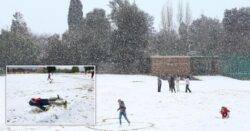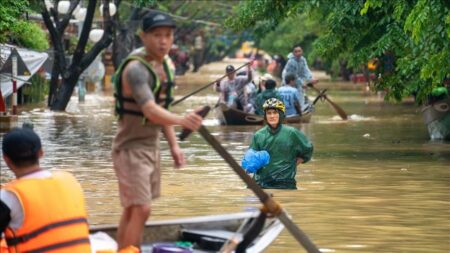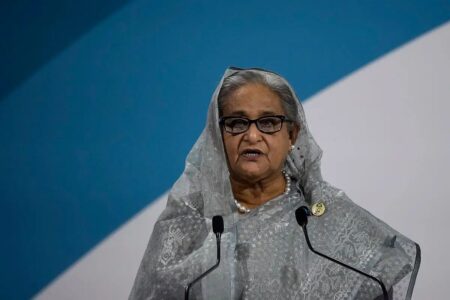For some children under the age of 11, this will be the first time they have ever seen snow (Pictures: Reuters)
Snow has fallen on Johannesburg for the first time in more than a decade.
The South African city woke up to snowflakes, rain and wind, with temperatures cold enough to keep the snow lying on the ground through the morning.
Photos show children wrapped up in coats and beanies, making snow angels on their school fields.
For some youngsters, today will be the first time they have ever seen snow.
The last time snow was officially confirmed in Johannesburg was in August 2012.
The South African Weather Service (SAWS) has issued several cold weather warnings, with drivers told to be careful of icy roads and expect disruption.
Several regions of South Africa have had a harsh winter this year, especially over the last weekend.
Children playing in the snow at school, in the suburb of Brackenhurst, south of Johannesburg (Picture: Reuters)
Today is a contender for one of the coldest days of the past 12 years for the region (Picture: Reuters)
A man walking through a park during the snow storm (Picture: AP)
South Africans had to wrap up extra warmly to go about their daily jobs today (Picture: Getty)
‘Cold weather conditions have battered parts of the country,’ the SAWS said.
Last night was estimated to be the coldest evening of 2023 so far for Johannesburg and surrounding places, with temperatures dipping below 0°C.
Today has seen temperatures of 4°C in the city, where the average for July is 16.7°C.
Regional forecaster Gauteng Weather said today will be a contender for one of the coldest days of the past 12 years.
Besides the fact many South African homes are not equipt for cold weather, the country is currently in the throes of its worst-ever energy crisis.
The nation has long faced organised power cuts, dubbed ‘loadshedding’, with its once-world-class public power utility Eskom on the brink of collapse.
For a string of complicated reasons, including corruption, Eskom has not been able to consistently provide power since 2007.
More: Trending
Loadshedding has become more frequent in recent years and now the average South African goes without electricity for 6.2 hours a day, according to Power Engineering International.
By May 9, most households in the country had gone through an accumulative 34.56 days without power.
This means many families will have to face this week’s cold conditions without heating, hot water or the ability to cook on an electric stove.
Get in touch with our news team by emailing us at webnews@metro.co.uk.
For more stories like this, check our news page.
The last time snow was officially confirmed in the South African city was in August 2012.





